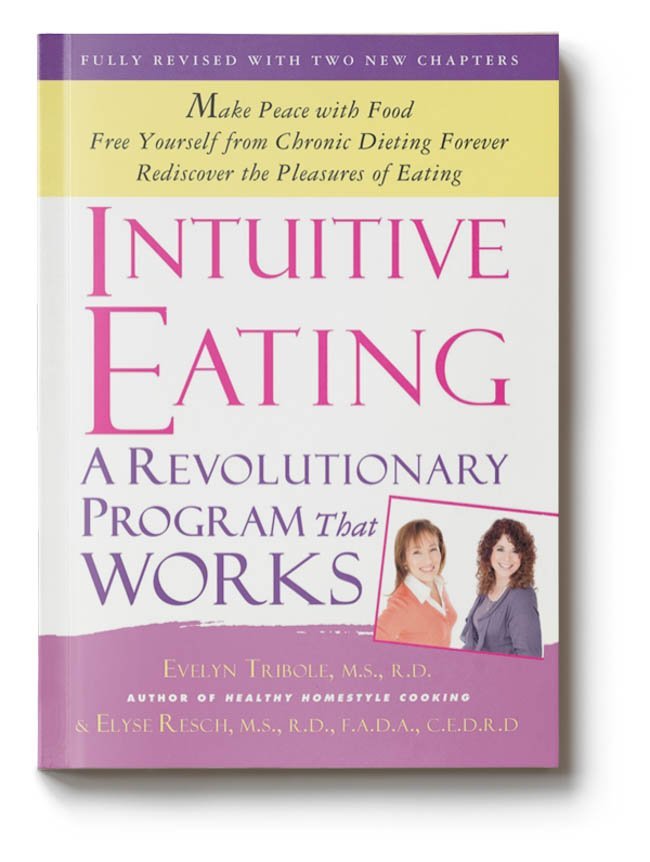With the holidays in full swing, we thought it would be a perfect time to introduce the concepts of intuitive eating. Do you ever wait until you are “hangry” to eat a meal? Or do you ever eat until you are uncomfortably full (ie. the holiday food coma)? Or do you have foods that are “off limits” or have complete food groups that you have cut out, but make an exception since it’s the holidays?
As dietitians, we often have clients come to us who are exhausted and feeling completely defeated from the constant dieting. They’ve tried everything from paleo to keto and are not feeling confident in themselves or their bodies. Once the holiday season comes around, they may come to us with feelings of shame and disappointment because they “overdid it” or perhaps they binged on their favorite foods. This is when we like to introduce the concepts of intuitive eating.
Intuitive eating is an anti-diet approach to health and wellness focusing on respecting your body and trusting your own instinct when it comes to hunger and health. The concepts of intuitive eating were first introduced by two registered dietitians, Evelyn Tribole and Elyse Resch.
The main objective of intuitive eating is to reject the diet mentality and achieve a healthy relationship with food through trusting yourself and listening to your internal cues. Eat when you’re hungry, eat until you are satisfied, and choose foods that make you feel good.
This may be a lot easier said than done because our society has taught us that we cannot trust our bodies…that we must control ourselves in order to control our weight. But ultimately, we can trust our bodies. We were born with the intrinsic signals to know when we’re hungry and full. Think about infants. They cry when they’re hungry and they will push the bottle away when they have had enough. When we grow up, we lose sight of those internal cues.
The 10 Principles of Intuitive Eating can help getting you started on the path to trusting your body through that next holiday party:
1. Reject the diet mentality – For most people, diets do not work. Bottom line. Get rid of the mentality that you need to lose weight or be thin to be healthy. You can achieve health at every size, and your weight should not be an indicator of how you feel about yourself.
2. Honor your hunger – Listen to your body and eat when you feel a sensation of hunger. Many diets teach to you to do the exact opposite. By honoring your hunger, you’ll decrease your chances of reaching that hangry stage. If you don’t fuel your body when those hunger cues hit, you may find yourself overeating during the next meal. Honor your hunger and eat when you’re hungry.
3. Make peace with food – Give yourself permission to eat! Give yourself permission to enjoy. Food is meant to be an enjoyable experience. Ditch the guilt associated with indulging in decadent and delicious foods. By getting rid of the “good” food, “bad” food rules, you can satisfy your cravings and reduce binges.
4. Challenge the food police – Rid yourself of the mentality that you are a better person for eating “good” foods or a terrible person for eating a “bad” food. All foods have a place. Remove the restrictions and food rules that you and others have placed on certain foods and food groups.
5. Respect your fullness – Listen to your body and eat until you are satisfied. Your body will tell you when it has had enough, so listen! What does pleasantly full feel like? Pause while you’re eating and ask yourself how the food is tasting to you and assess how full you are feeling. Use the scale below to help you answer these questions.
6. Discover the satisfaction factor – Do you enjoy those plain, steamed veggies? When dieting, we often lose the sense of enjoying our food. Make it an experience to be savored and enjoy every bite. Spice up those vegetables, add some salt, garlic, and onions, and enjoy them with your favorite pairings!
7. Honor your feelings without using food – Finds coping mechanisms for anxiety, stress, sadness, and even happiness and joy that do not involve food. Food will not fix any of your feelings. Learn to adapt new techniques like journaling, exercise, meditation, or other hobbies that help you deal with the emotions.
8. Respect your body – Accept your body. Accept your shape. Accept the weight that is healthy for your body to be at. Learn to love your body just the way that it is.
9. Exercise – Feel the Difference – Find movement that your body enjoys. Get active and feel the difference. Focus on how movement makes you feel. Do you have more energy? Are you sleeping better? Ditch the mentality that exercise should be gruesome process to achieve external results.
10. Honor your health – Eat foods that will nourish your body and promote good health and wellbeing. Make food choices that make you feel good.
During the holidays, give yourself permission to enjoy those holiday foods. Satisfy cravings and eat until you are full. Don’t try to “save” calories by not eating all day and binging at the holiday party. Continue to feed your body according to what you are needing throughout the day. Choose foods based on what seems appetizing to you at that meal time. Take the time to enjoy your food but also make space to enjoy the company around you.
To get started with intuitive eating, ask yourself some introspective questions. How would your life change if you stopped obsessing over food? How would your outlook change if you no longer felt guilty for eating certain foods? Would you be more satisfied if you allowed yourself to fulfill your cravings?
Intuitive eating helps to improve your relationship with food and bring the joy back into eating, especially during the holiday times. How many of you have ventured into the world of intuitive eating? What are your thoughts about these concepts? Any tips for intuitive eating during the holiday season? Let us know in the comments below!




I absolutely love this article!!! I actually touched on the subject of mindful eating in an article I recently wrote. It’s about staying healthy through the holidays, and it made me think about all the food comas my family and I have put ourselves into over the years! My dad actually has a little nap after every Thanksgiving meal because he stuffs himself so much! lol
I really believe that following your body’s cues will get you much further than calorie counting. While calorie counting works well, it’s not a sustainable lifestyle for many people. It’s tedious, requires portion control, measuring, and keeping track of everything. Plus, if you “go over calories”, you’re left feeling guilty, which leads to comfort eating, bingeing, giving up, etc.
Mindful eating allows us to enjoy the foods we love within reason, and without obsessing over numbers or portion sizes. We can enjoy treats without thinking of “making up for it” by exercising more or cutting back the next day. Being in tune with your body is so wonderful, and it makes life more enjoyable!
If anyone is interested in my article where I recommend mindful eating, you can find it below! It’s the first part in a series on staying healthy through the holidays (focusing on eating well, exercising, and managing stress), but it applies to the whole year, really!
https://saltandskillet.com/2017/11/20/staying-healthy-through-the-holidays-part-1/
Thanks for sharing Amy!
Lots of great points, and while I love the idea of intuitive eating I think we need to be honest with ourselves: If we’ve been eating a lot of edible consumables as opposed to whole foods we can’t eat intuitively. Highly processed junk food destroys our taste buds and creates cravings for sugar and salt. Junk food is “bad” food. We have to eliminate it from our diets, regardless of whether we’re trying to slim down or not, so that we can retrain our tastebuds and trust our bodies to tell us what to eat.